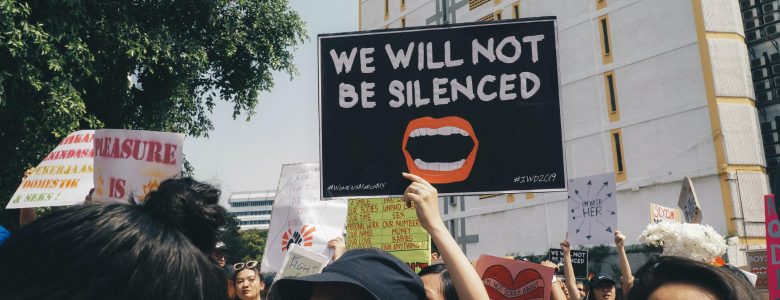July 30, 2020
Know Your Rights: A Guide for Protesters by Peter

“We will not be silenced!”
Souce: Stock image provided by Peter
Peter of Joyful Source teaches us how to stay protected during a protest.
Civil unrest seems to be prevailing around the world in many countries, some of them sparked by outrage over the COVID-19 restrictions, others caused by police brutality, and some due to decades-long dictatorships or the poor overall quality of life.
No matter the reason or the cause for protests in your city or country, there’s no denying these events can spiral out of control rather quickly.
If you’re thinking of attending a protest, you need to know how to protect yourself.
Aside from the obvious fact that you should keep away from dangerous crowds and wear the right protective clothes along with plenty of water and a first-aid kit just in case, you should also know your legal rights in case things do get out of hand.
Many a time, people will go to a protest unprepared or unaware of their rights, which can lead to them getting hurt, unlawfully arrested, and more. To prevent this, be sure to take a look at this short but essential guide on your basic rights at protests.
Your Right to Protest Peacefully
Peaceful protests are allowed in any democracy, and these acts of civil unrest represent the foundation of democratic societies that are allowed to voice their discontent.
Unless you’re living in a totalitarian dictatorship, there is no governing body or figure that can legally prevent you from protesting in a peaceful and orderly fashion.
That said, you can only do this by following a set of rules.
Firstly, consider notifying the authorities of your protest, its exact time and location, and where the protest line will be moving throughout the city.
The authorities can assign a date, time, and location for you in some cases, which you have to abide by in order to remain within the limits of law. This way, order is preserved and the authorities can minimize the risk of incidents.
Are You Allowed to Record the Protest or the Police?
When the media doesn’t portray the right picture of what’s going on during protests and demonstrations, it’s up to the people to take matters into their own hands.
That said, protesters are often wary of raising their cameras at the police or other protesters in fear of legal liability and even police brutality.
While there is unfortunately not much you can do about the latter, you should know you have the right to record the protest and the police in any democratic society.
Don’t be afraid to film all acts of police brutality, because that’s what brings crooked cops to justice.
Familiarize Yourself with Local Laws
In order to stay safe at protests and demonstrations, you have to research the local laws and regulations in your country and region.
The laws that protect the citizens can vary greatly between countries and different regions of the world, so you shouldn’t assume that you have the same rights as other protesters from different states or countries.
For example, in Australia protesters will often seek advice from lawyers before heading to a protest.
Depending on where the protest is being held, people can talk to professional criminal lawyers in Parramatta, or wherever they’re located, and seek specific guidance on local laws and regulations, just to stay on the safe side.
Be sure to do the same and talk to your local lawyers that know the ins and outs of criminal law in your region so that you know exactly the rights you can exercise at a protest.
Can the Police Order You to Leave?
Oftentimes, the authorities will try to disperse the protesters if the situation escalates, or if the protest has gone on longer than it should have.
While you should leave the protest if you see the situation is getting out of hand, you should know the authorities do not have the right to make you leave if you’re well within the parameters of the event. However, you are obligated to leave if the authorities impose a curfew.
What if You Get Arrested?
In the unlikely case that you get arrested at a protest, you have to know your rights in order to avoid being treated unfairly, or to prevent police brutality. In no case should you resist arrest, as that will be used against you in court.
You should also remain silent during the arrest, and if you’re booked into jail, you should call your lawyer immediately.
Do not call your friends or family members, because the police have the right to listen in on your call – be sure to talk to your lawyer only.
In Conclusion
Attending a protest is a powerful way to voice your concerns and show the government that you have a right to be heard.
That said, you shouldn’t go blindly into the masses, rather, you should prepare yourself and know your rights in order to keep yourself and the other protesters safe.
Head on over to Joyful Source to read more of Peter’s work!
Be sure to follow Peter on Twitter to keep up with his writing, as well.
Interested in having content featured in an upcoming blog post or issue of The Burgundy Zine? Head on over to the submissions page!
For all other inquiries, please fulfill a contact form.

